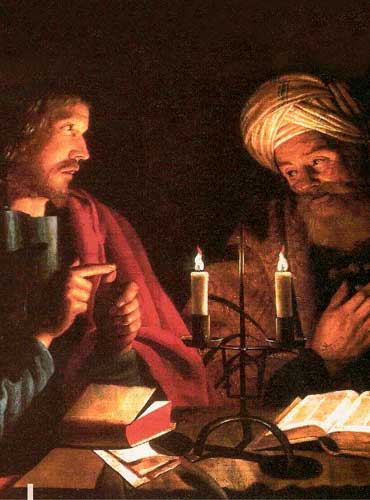Monday of the Second Week of Easter – Jn 3:1-8
Today, as we enter the second week of Easter, the Church asks us to mediate on the encounter between Nicodemus and Christ. At first glance, as Saint Thomas Aquinas notes, there doesn’t seem to be much of a connection between Nicodemus’s affirmation that Christ is “a teacher who comes from God,” and Christ’s immediate response that Nicodemus must be born again. However, Aquinas comments that Christ responded this way because He could see that Nicodemus, while a good man, had an imperfect understanding of the Son of God. Wishing to lead the Pharisee to a deeper understanding, Christ gently pointed out the way, and led him to a deeper understanding of His divinity.[1]
The same happens in our lives: as religious, we’re privileged to live constantly in Christ’s presence, and to be called to ever deepen that relationship with Him. In this work, we can take some time to reflect on Christ’s words: “The wind blows where it wills, and you can hear the sound it makes, but you do not know where it comes from or where it goes; so it is with everyone who is born of the Spirit.” In particular, we can examine two points Christ makes: first, our ignorance of the ways of the Spirit, and, second, the Spirit’s effects.
Regarding the first, Christ tells Nicodemus “you do not know where [the wind] comes from or where it goes.” God’s workings are a mystery for us; the Catechism reminds us that “even when He reveals Himself, God remains a mystery beyond words: ‘If you understood Him, it would not be God,’” quoting Saint Augustine.[2] Nonetheless, the Paschal Mystery reminds us that God is love, and that everything that He does or permits, is done with and from this. The ways of God are mysterious, just as the detailed workings of a surgeon are, at first, hard to grasp. If viewed superficially, the giving of anesthesia, the cutting, the stiches, all seem rather brutal and unnecessary. Yet, just as a surgeon works for the health of the patient, God works for our good and our salvation. Commenting on this, Saint John Chrysostom says, “Here is the conclusion of the whole matter. If, He says, you do not even know how to explain the motion or path of this wind, which you perceive by hearing and feeling, why are you so anxious about the working of the divine Spirit, when you do not even understand how the wind works, although you hear its voice?” God’s workings are mysterious, but, because we know He works for our good, there is no need for anxiety; such worry would be “vanity and a chase after wind” (Eccl 2:11).
Secondly, though, we’re reminded of what we can see: the effects of the wind. The life of the spirit isn’t something theoretical, or something vague. We don’t live the religious life in the abstract; we live it in the concrete here-and-now, and it’s there that we see God at work, giving us the graces that we need to get through each day and to become holy. Sometimes it helps to take a step back and remind ourselves of the greatness of God’s grace, His goodness towards us, and how we have seen that power at work, transforming people, ourselves included, into holy (or at least holier) people. When we are truly detached from all that is not God, His Spirit can blow us to wherever it is we need to go. We might not know where it comes from, or where we are going at this moment, but ultimately the goal is heaven.
Today, let us pray, through the intercession of Mary, Mother of Mercy, for the grace to detach ourselves from all that is not God, so that we can embrace and trust whatever it is He sends our way.
[1] Cf. Thomas Aquinas, Commentary on the Gospel of John, 431
[2] CCC, 230.





